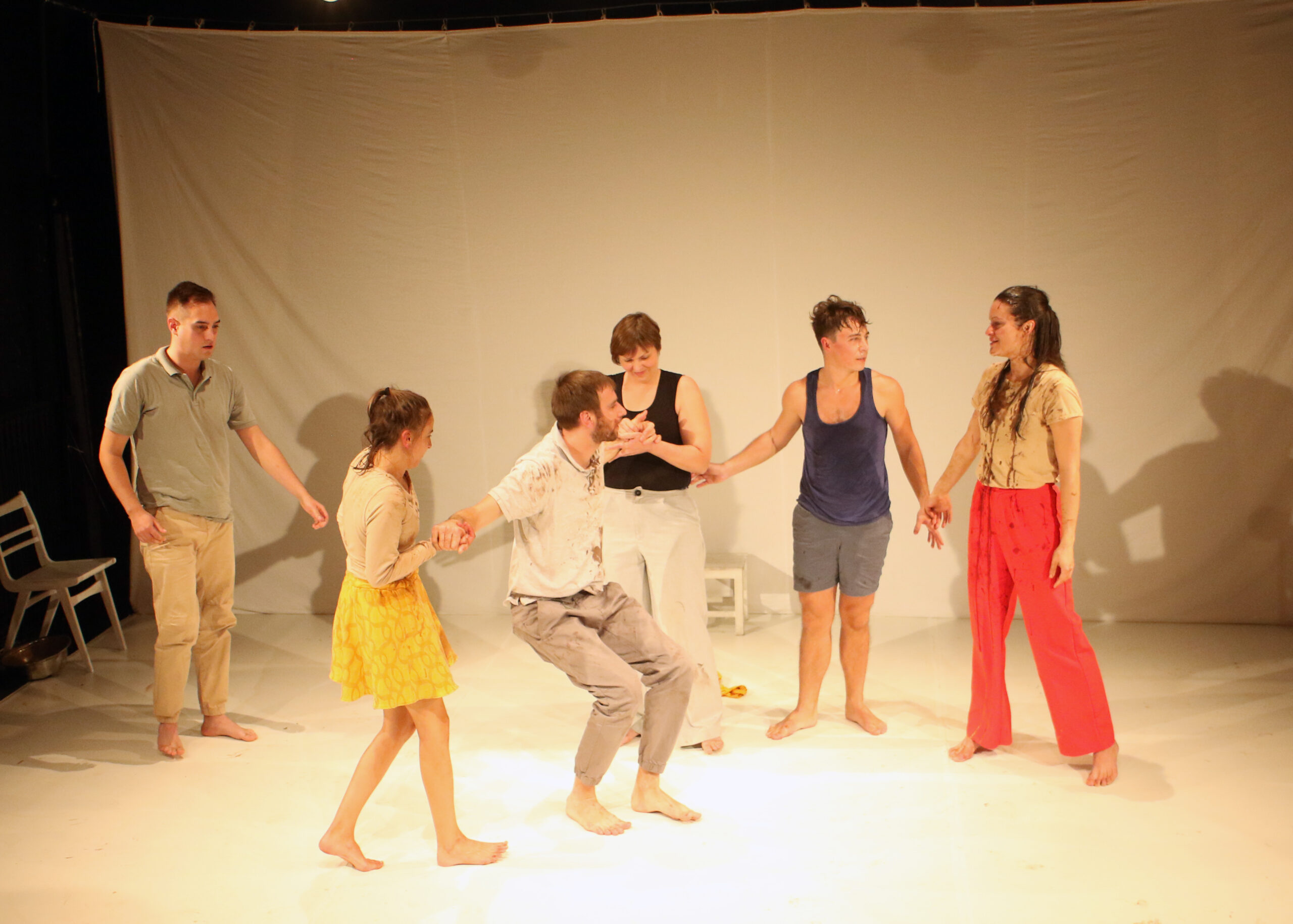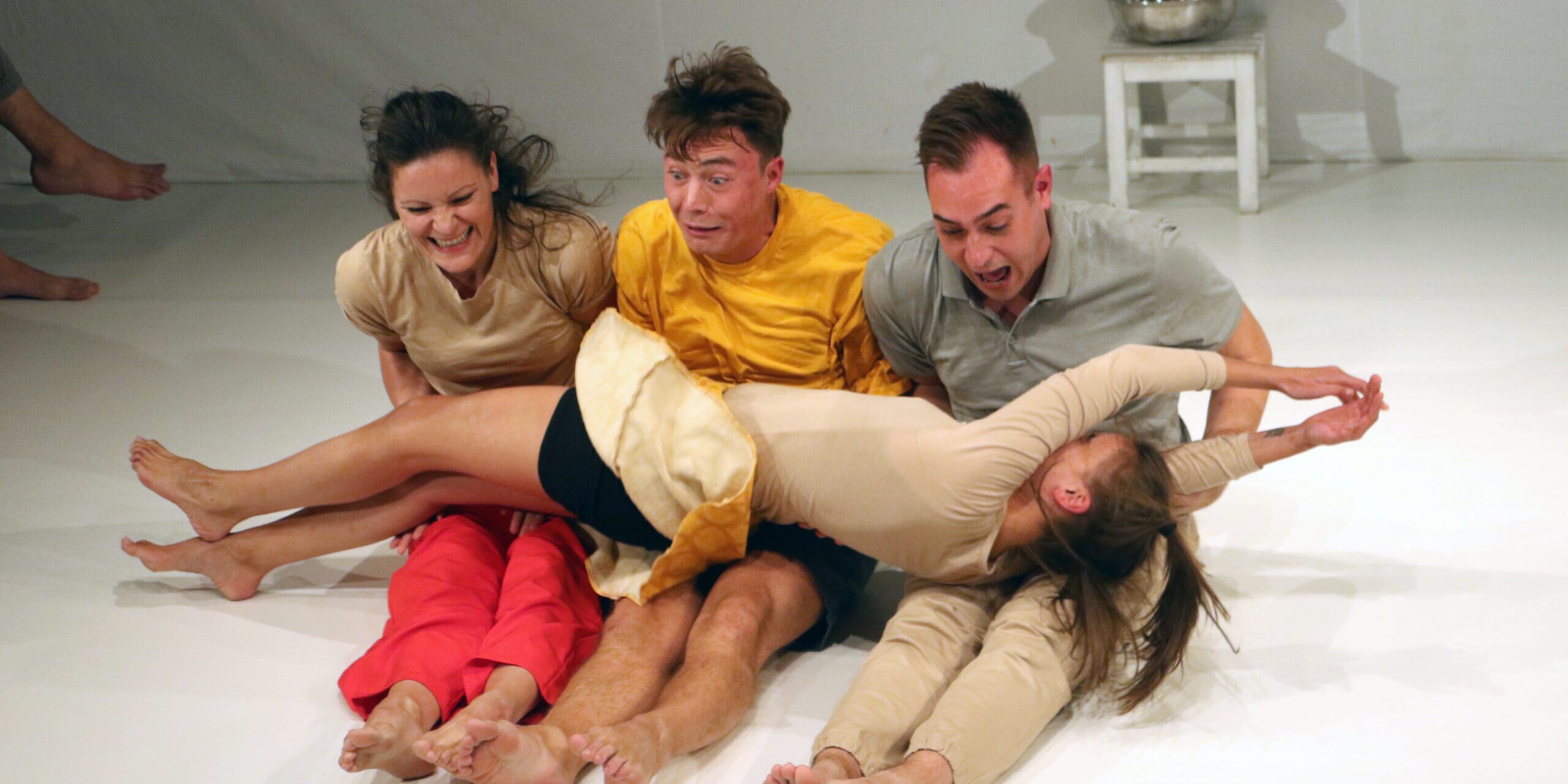Children’s Theater, Subotica, premiere October 2022
During Don’t Go Far directed by Tamara Kučinović and produced by the Children’s Theater in Subotica, the audience is like a cursor, constantly blinking and searching for more – more of these beautifully stripped-down, sincere stories, more laughter and joy from the main characters, more time with the family on stage, more understanding and forgiveness, more space for the audience to feel and process a conglomerate of emotions.
This intimate, chamber performance, where the audience is on stage, is officially intended for ages ten and above. The story begins as a portrait of a happy family (dramaturg Matea Bublić). Through movement, we follow a story of a Young Mother (brilliantly played by Viktorija Palfi) and a Young Father (Stefan Orovec) who gets to know each other and later have a Son (Marko Vujević), the protagonist of the play.
What is somewhat confusing or rather unnecessarily distracting for the audience at the beginning of the play until the convention is accepted is that the protagonist is a boy but the narrator (director’s voice) who tells the story off-stage throughout the performance is female. The Son talks about his understanding of the phenomenon of the soul, his favourite days, his carefree childhood, and the games he played with his parents. Total happiness is achieved by a mischievous, imaginative, and silly younger Sister (Staša Blečić, who never crosses the line of caricature). The Sister constantly has bright new ideas for exciting games and exclaims, I thought of something.
The ideal family is destroyed by the Father’s departure to war, who returns changed after three years. Not only does his soul and nature change but so does the actor portraying the Father (the fantastic and expressive Uroš Mladenović).
Although the war changed the Father, the change itself can be interpreted as the result of any other trauma that changes or hides the Father’s soul and makes the family dysfunctional. This resonates with a younger, post-war generation. The war was chosen as the director’s personal story and as one of the extreme traumas that can destroy a person’s psyche. In this way, the play acts as something nurturing and healing for both younger and older audiences.

Ne Idi Daleko
The depressed, grumpy, aggressive, and frightening Father first causes the mother to become passive and depressed (played by Danka Balać). Later, he breaks the Sister’s spirit, her cheerfulness, and her curiosity too. The relationship between the Father and Son is resolved through exceptionally clever movement – the Son tries to catch the Father who constantly evades and runs away; the Father is insensitive and avoids confrontation. Then the Son seems to gather all the courage he could find in his soul, and his highness of forgiveness comes onto the stage. The Father allows the Son to see the horrors he experienced in the war and his fears, so the boy accepts and embraces him.
The relationship between the Sister and brother is presented through several gentle, nurturing, and playful scenes when they play together. That is why the boy tells his Sister, Don’t go far, so you don’t leave me. The protective relationship of the older child towards the younger one is accurately portrayed, especially since the Son forgives the Father for making his mother passive but enters into conflict after the Father takes away the Sister.
The scenography (Davor Molnar) consists of a projection of a collage made up of photographs of children who, in the beginning, have joyful expressions on their faces but then look sad or disappear after their Father returns from the war. This scenography, along with the simplicity of the stage design and the actors’ understated costumes, fits perfectly in both meaning and aesthetics. The off-stage narration is followed by music (Petar Eldan) – melancholic piano music that tries to add emotion to a story that is already emotional enough. Instead, the music could have been used more imaginatively.
The decision to present such a story in a children’s theatre is a brave one and deserving of praise. It shows a bold way of thinking by the management that we, as an audience, can hope will continue to see. Healing the collective trauma caused by wars and their impact on families and society in our region is especially necessary, as there is no systematic approach to dealing with these issue. Theatre can serve as a good starting platform for tackling these problem. This play is a strong example of this.
The anti-war play, Don’t Go Far, was created for children’s theatre and primarily addresses them, proving that there are no topics that should not be discussed, but only an appropriate way of approaching the subject.
All unhappy families in the Balkans are alike, but every happy family is happy in its own way. There are so many absent, passive, aggressive, violent Fathers, traumatized by war, and the various behaviours that are passed down through generations. It is a cathartic experience to witness forgiveness, understanding, and the cessation of that cycle on stage. Without any irony or sentimentality, if we start to notice and talk about such things now, the world can be a little less scary and lonely place for all of us.
Photo: Dejan Vuković
For tickets and more information, visit: suteatarzadecu.rs
Divna Stojanov is a dramaturg and playwright. She writes mainly for children and young people.








